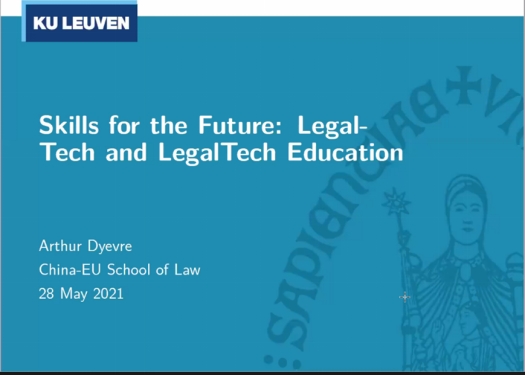On May 28, the Conference on the Future of Legal Education, sponsored by China-EU School of Law (CESL), China University of Political Science and Law (CUPL), was successfully held online. The conference focused on the important theme of legal education and brought together experts and scholars in relevant fields at home and abroad for in-depth discussions on the following topics, i.e., Technology in legal education: Experiences and skills for the future, Directions of legal education: Skills for the next generation of legal professionals, Learning across borders: and Internationalization of legal education. Over ten experts and scholars from China and Europe, including Prof. Huang Jin, Vice President of China Law Society and President of Chinese Society of International law, Prof. Wang Jingbo, Vice President of University of International Business and Economics, Prof. Xie Zhiyong, Dean of the College of Comparative Law, CUPL, Prof. Yuan Zhijie, Vice Dean of the Law School of Beijing Normal University, Prof. Gao Simin, Vice Dean of Tsinghua Law School, Prof. Hinrich Julius, professor at the Faculty of Law at Universität Hamburg and European Co-Chair of the Joint Managerial Committee of CESL at CUPL,etc., were invited to attend the meeting and deliver keynote reports.

At the beginning of the conference, Prof. Liu Fei, Chinese Co-Dean of CESL at CUPL, said that from Class of 2021, CESL graduate students studying for double masters would spend their second year at Universität Hamburg in Germany for a one year exchange and would obtain the master's degree from the Universität Hamburg. He stressed that it was of great significance for CESL to further optimize the training programs for foreign-related legal talents, so as to promote the legal cultural exchanges between China and Europe and to advance the cultivation of foreign-related legal talents.
CUPL Vice President Shi Jianzhong mentioned that the wide application of digital technology had facilitated legal education to advance toward a new development model. Transnational cooperation in legal education has also explored a new model. In the fourth round of the national discipline assessment organized by the Ministry of Education, the law discipline of CUPL got the best score of A+. According to RANK, the most authoritative and influential private rating institution in China, CUPL continues to rank first among law schools and institutions in China. All these results indicate that CUPL represents the top level of legal education in China.
Then, professors shared their insights on the topics of the conference. Prof. Aalt Willem Heringa of Maastricht University, former CESL European Co-Dean, delivered a speech on The Lessons for Legal Education to be Relevant and Meeting Societal Needs. Prof. Zheng Yongliu delivered a keynote speech on The education mode of international legal professionals. Prof. Mareike Schmidt, Faculty of Law, Universität Hamburg, discussed his views on Digital teaching in pandemic times: Lessons learnt. Dr. Ulf Maunsbach, Associate Professor of Lund University, Sweden, delivered a speech on Transforming (the Law Program Lund) under Pressure – What have we done and what can we learn? Pro. Arthur Dyevre from the Centre for Legal Theory and Empirical Jurisprudence, KU Leuven, Belgium, delivered a speech on Skills for the future: Legal Tech and Tech Legal Education.
In the Q&A session, the experts and scholars responded to students’ questions such as how to take practice-oriented courses online and presented their views.

